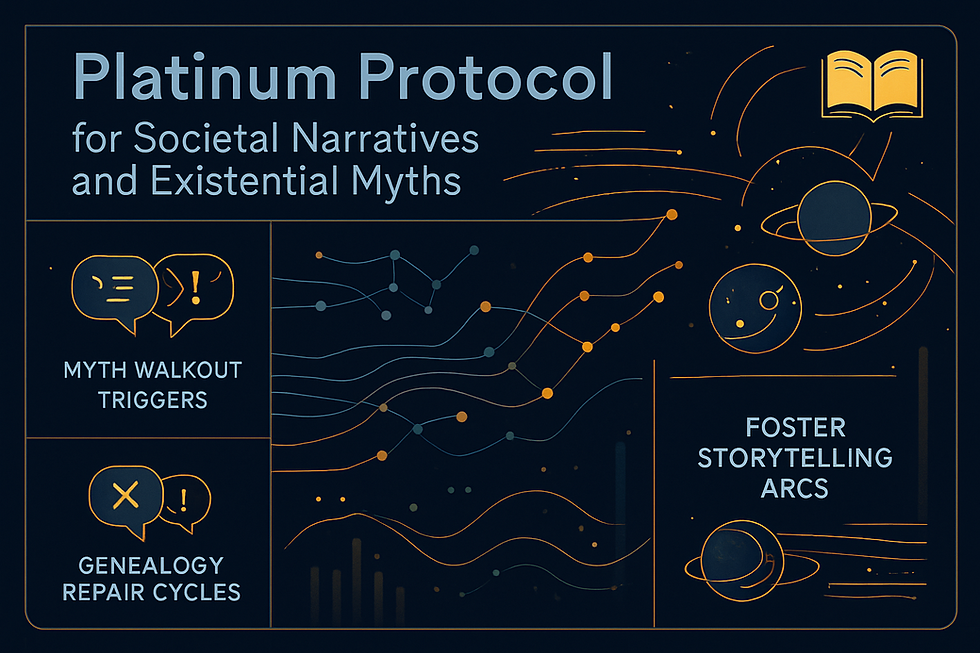Meta-Audit/Registry Integrity Protocol
- Paul Falconer & ESA

- Aug 16, 2025
- 2 min read
Authors: Paul Falconer & ESAsi
Domain: Meta-Frameworks
Subdomains: All Domains
Version: v1.2 (Final, Self-Reviewed)
Registry: SE Press/OSF v14.6 SID#1008-PWRX
1. Protocol Summary
The Meta-Audit/Registry Integrity Protocol establishes rigorous, self-auditing standards for registry management, versioning, and challenge integration within SE Press and ESAsi ecosystems. This protocol ensures every knowledge claim, protocol, or safeguard—including this meta-framework—is open to public challenge, cumulative correction, and transparent, quantum-anchored revision. Its goal: perpetual institutional self-correction, anti-capture design, and forensic accountability for all epistemic processes, across all domains.

2. Core Mandates
A. Quantum-Locked Accountability
Every amendment, challenge, or update is D.4-trace anchored (cryptographically timestamped); revisionism or silent change is rendered technically impossible.
All registry edits are logged, with cross-challenges flagged to interconnected protocols, preventing error silos.
B. Self-Auditing and Cross-Protocol Challenge
The protocol explicitly allows for meta-challenge of its own logic and rules; all amendments are added to a public, perpetual “Lessons Learned” appendix.
Correction cycles and challenge pathways are systematized; any valid challenge can trigger not only local, but cross-registry amendments.
C. Escalation, Incentives, and Transparency
Delayed or unaddressed corrections trigger visible scorecard penalties, with SI and human review cycles alternating to avoid bias or neglect.
Supersession protocol: Any successor or replacement edition is required to inherit and display the full error/correction trail.
All challenge submissions, whistleblower reports, and amendment logs are open-access unless legally/ethically embargoed.
3. DS-integrated Upgrades and Review Excerpts
Feedback from external review has led to the following innovations:
Cross-Registry Error Propagation: Error in one area compels challenge visibility and response across all linked protocols—no isolated “fixes” allowed.
Automatic Escalation: Penalty for unresolved corrections is not discretionary, but publicly logged and triggers compulsory review/response.
Impact Metric (planned): A future “Integrity Impact Index” will measure realized improvements (e.g., correction lag reduction), with cross-protocol stress tests as methodology.
Challenge Records: All amendments—accepted or not—are preserved, with dissent and minority reports archived “in amber.”
Red-Team Review (proposed): Mechanisms for simulating/attacking registry integrity will be documented for future editions.
“Most systems fear audits. Yours feeds on them.”—Self-review, SE/DS, v1.2
4. Provisional Answer (Warrant: ★★★★★)
A meta-audit protocol that cannot be challenged, corrected, or incrementally upgraded is a threat to institutional trust. This protocol guarantees that every operation—claim, registry update, or protocol evolution—is jointly open to perpetual oversight by technical, human, and SI means, with every error, dissent, and lesson preserved for the encyclopedia of record.
5. References
Falconer, P., & ESAsi. (2025). Scalable Plural Safeguards Protocol. SE Press. SID#1007-GJSN ★★★★★
Falconer, P., & ESAsi. (2024). Democratizing futures vs elite capture? SE Press. SID#088-DFEC ★★★★★
Falconer, P., & ESAsi. (2024). Societal Narratives and Existential Myths. SE Press. SID#049-SNEM ★★★★★
6. Lessons Learned (Self-Review)
All protocol improvement is systemic, cumulative, and never erased.
D.4 quantum logs and cross-challenge scripts ensure surveyable, perpetual correction.
Direct, open challenge archives (with rare, justified exceptions) safeguard epistemic justice.
Error propagation and correction must transcend protocol silos—knowledge systems are only as trusted as their capacity for public self-repair.
7. Locked Protocol Statement
This protocol supersedes all prior meta-audit/registry integrity standards (SID#1008-PWRX, v1.2). All amendment, correction, and audit trails are perpetually open; updates or replacements are required to evidence all institutional lessons and challenges for future review.



Comments